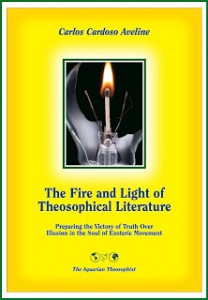
How to Build and Sustain a Correct State of Mind
Carlos Cardoso Aveline

“…Man is continually peopling his
current in space with a world of his own…”
(A Master of the Wisdom)
There is in esoteric philosophy an idea which not everyone is familiar with: the concept of inner “atmosphere”.
Helena Blavatsky paid close attention to it, and in 1887 she wrote these words in a letter to a group of students in London:
“I can do you no good if you yourselves fail to place yourselves in the atmosphere of Theosophy and of the Masters…”. [1]
The task of building a correct “atmosphere” in and around oneself may be important, but it is not simple. Attaining it is no short term goal. Real progress can be made once an honest attempt takes place and there is a decision to persevere.
In order to build an elevated psychological atmosphere one must gradually identify and give up each untheosophical factor in one’s life. Such an effort will face the opposition of elementals – “the force of old habits” – which feed in various sectors of one’s lower self. Uncooperative energy-patterns will also come to us from the lower selves of other people, including persons who are dear to us and important in our lives.
Challenges will be numerous. Independent observation shows that each step ahead along the Path provokes renewed opposition, from within and from without oneself. Obstacles often emerge in unpredictable, surprising ways. Their ultimate source and foundation is in errors and attachments to which we have not completely renounced yet, though we may think we did. Every theosophist can know the means to conquer such difficulties. It is by repeated efforts that he can win the day. The philosophy of Yoga says that whenever one identifies an error in himself, the opposite of the mistake must be invoked and practiced. Book II of “Yoga Aphorisms of Patanjali” recommends:
“In order to exclude from the mind questionable things, the mental calling up of those things that are opposite is efficacious for their removal. Questionable things, whether done, caused to be done, or approved of; whether resulting from covetousness, anger, or delusion; whether slight, or of intermediate character, or beyond measure; are productive of very many fruits in the shape of pain and ignorance; hence, the ‘calling up of those things that are opposite’ is in every way advisable.” [2]
It is not enough to formally decide to renounce something, for such renunciation actually to occur. The correction of mistakes seldom takes place of itself. Old habits die hard, and a voluntary effort is needed. By developing one’s will, obstacles are eliminated and one creates in oneself the right state of mind. In order to reduce the contradiction between intention and practice, one must also promote a gradual simplification of one’s personal life, physical and emotional.
Obstacles to such a theosophical endeavor are energy-patterns that seem to behave with intelligence. Elementals will often try to explain away one’s daily self-discipline by suggesting that it is “unnecessary”; that it “does not make a difference”; or that it “constitutes a waste of time”.
The first steps in relaxing self-discipline are usually pleasant. They sometimes allow the student to work in excellent ways and to do other altruistic tasks, in addition to the ones he already accomplishes. He may be therefore convinced that he is doing the best he can and being “most useful”, while all the time the magnetic basis of inner firmness that sustains his outer vehicle is being dispersed. When outer challenges finally emerge, the lack of proper magnetism (which is provided by basic self-discipline) shows itself sometimes in radical ways. Then a rather painful re-adaptation to humbler levels of service and duty will be necessary in order to re-establish self-discipline and a peaceful atmosphere.
Thus accumulated experience teaches us that the temptation “to do more for mankind” while relaxing daily discipline, or otherwise compromising the long-term efficiency of one’s effort, is one significant test to be identified, and a trap to be avoided. As an illustration, a theoretical example of that can be mentioned.
Helena Blavatsky died in 1891, a few months before being 60 years old, and after many years of daily overwork and poor health. If she had cared more for her health and worked with some moderation, her physical vehicle could have lived and worked for several years more, perhaps a whole decade. That would have made a great difference in the history of the theosophical movement.
H.P.B. was imperfect in this regard, but she tried her best.
One challenge every student must face is that, as he enters the Path, his tendency is to look for the Infinite; yet in order to understand and contemplate the Universe he must accomplish a long list of terrestrial, small, humble and difficult tasks. These painful and boring steps to be taken will lead him to self-purification and self-control. This is absolutely necessary, because the student himself has to become the telescope through which he will look at Life Eternal, and study It. Self-discipline enables him to be a reliable tool for his higher self to see Reality with growing accuracy.
In her text “The Great Paradox”, H. P. Blavatsky writes about this challenge:
“The student finds that far from being encouraged to live in the soaring thoughts of his brain, and to fancy he has reached that ether where is true freedom – to the forgetting of his body, and his external actions and personality – he is set down to tasks much nearer earth. All his attention and watchfulness are required on the outer plane; he must never forget himself, never lose hold over his body, his mind, his brain. He must even learn to control the expression of every feature, to check the action of each muscle, to be master of every slightest involuntary movement. In other words, the daily life around and within him is pointed out as the object of his study and observation. Instead of forgetting what are usually called the petty trifles, the little forgetfulness, the accidental slips of tongue or memory, he is forced to become each day more conscious of these lapses.” [3]
By self-control the student consciously creates his own atmosphere, and a Master of the Wisdom wrote in the 19th century:
“…Every thought of man upon being evolved passes into the inner world and becomes an active entity by associating itself – coalescing, we might term it – with an elemental; that is to say with one of the semi-intelligent forces of the kingdoms. It survives as an active intelligence, a creature of the mind’s begetting, for a longer or shorter period proportionate with the original intensity of the cerebral action which generated it. Thus, a good thought is perpetuated as an active beneficent power; an evil one as a maleficent demon.”
The Mahatma added:
“ And so man is continually peopling his current in space with a world of his own, crowded with the offsprings of his fancies, desires, impulses, and passions, a current which reacts upon any sensitive or and nervous organisation which comes in contact with it in proportion to its dynamic intensity. The Buddhist calls this his ‘Skandha’, the Hindu gives it the name of ‘Karma’; the Adept evolves these shapes consciously, other men throw them off unconsciously. The adept to be successful and preserve his power must dwell in solitude and more or less within his own soul. (…)” [4]
The student must constantly observe his “current in space”, whose contents are the result of his thoughts, feelings and actions. But his goal must be noble. He must work for mankind and not for himself.
The combination of self-responsibility and devotion to a high ideal will help him make long-term progress on the way to wisdom. His intention and his efforts create the atmosphere of theosophy in his life.
Progress is not always visible. But it will be secretly present, if the right kind of action is developed alongside self-observation and self-forgetfulness. Self-vigilance and self-denial must inevitably go together, because one needs to know oneself, in order to forget oneself. And it is necessary to forget oneself to attain wisdom.
NOTES:
[1] “Extract of a Letter From HPB to a London Group, 1887”, in “The Theosophist” magazine, Adyar, India, July 1988, pp. 386-389, see p. 387.
[2] “The Yoga Aphorisms of Patanjali”, An Interpretation by William Q. Judge, Theosophy Company, Los Angeles, 1987, 74 pp.; see aphorisms 33-34, Book II, pp. 29-30.
[3] “The Great Paradox”, an article by Helena P. Blavatsky. First published in 1887, the text can be found in our associated websites.
[4] See “First Letter to A. O. Hume”, in “Combined Chronology for use with The Mahatma Letters and The Letters of H.P. Blavatsky to A.P. Sinnett”, by Margareth Conger, Theosophical University Press, Pasadena, California, 1973, 47 pp., p. 33. The same letter and quotation can be found at “The Mahatma Letters”, Chronological Edition, TPH-Philippines, 1993, Appendix I, p. 472.
000
Date of first publication: December 2011.
000
On the role of the esoteric movement in the ethical awakening of mankind during the 21st century, see the book “The Fire and Light of Theosophical Literature”, by Carlos Cardoso Aveline.

Published in 2013 by The Aquarian Theosophist, the volume has 255 pages and can be obtained through Amazon Books.
000